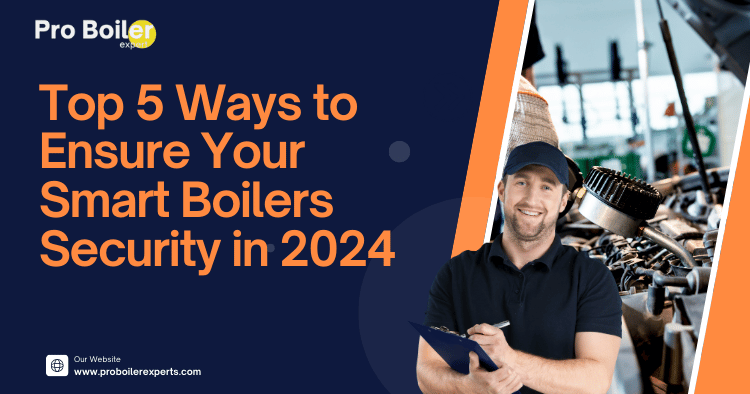Table of Contents
- Understanding Smart Boiler Security Risks
- Regular Software Updates
- Implement Strong Password Practices
- Utilize Network Security Measures
- Monitor and Audit Your Smart Boiler
Smart boilers are becoming increasingly popular in homes and businesses, providing efficient heating and hot water solutions. However, as with any smart device, they come with their own set of security risks. The convenience of these systems can be compromised if proper security measures aren’t taken. In this article, we’ll explore the top five ways to ensure your smart boiler’s security in 2024.
Understanding Smart Boiler Security Risks
Smart boilers connect to the internet, allowing users to control them remotely via mobile apps or voice-activated devices. While this connectivity offers convenience, it also creates potential vulnerabilities. Hackers can exploit these weaknesses to gain unauthorized access, leading to data breaches, service disruptions, or even physical damage to the boiler system.
Common Risks Include:
- Unauthorized Access: Hackers can gain control of your boiler settings.
- Data Theft: Personal information might be extracted from connected apps.
- Malware Attacks: Malicious software can be introduced into your home network.
To mitigate these risks, it’s essential to take proactive measures.
Regular Software Updates
One of the simplest yet most effective ways to enhance the security of your smart boiler is to keep its software up to date. Manufacturers often release updates that patch security vulnerabilities and improve functionality.
Why Are Updates Important?
- Fix Security Flaws: Updates often address known vulnerabilities.
- Enhance Features: New versions may offer improved security features.
How to Stay Updated:
- Enable Automatic Updates: Most smart boilers allow you to enable automatic updates. This ensures you receive the latest security patches without manual intervention.
- Check Manufacturer’s Website: Regularly visit the manufacturer’s website or subscribe to their newsletter for announcements on software updates. For more insights on smart boilers, check our article on the Top 5 Smart Boilers Revolutionizing Home Heating in 2024.
Implement Strong Password Practices
Using weak passwords is like leaving your front door wide open. To protect your smart boiler, implement strong password practices.
Tips for Strong Passwords:
- Use Complex Combinations: A mix of letters, numbers, and symbols is essential. Aim for at least 12 characters.
- Avoid Common Words: Don’t use easily guessable information, such as birthdays or pet names.
- Change Default Passwords: Manufacturers often set default passwords that are easily found online. Change these immediately upon installation.
Password Management Tools
Consider using a password manager to store and generate complex passwords. This can help you maintain unique passwords for each device. For further reading on security practices, see our article on Electric Boilers: Key Pros and Cons You Should Know.
Utilize Network Security Measures
Your smart boiler is connected to your home network, making it essential to secure that network as well.
Steps to Secure Your Network:
- Change Your Wi-Fi Password Regularly: Ensure your Wi-Fi password is strong and changed periodically.
- Use a Guest Network: If your smart boiler allows it, connect it to a separate guest network. This limits access to your primary network and reduces the risk of unauthorized access.
- Enable WPA3 Security: If your router supports it, enable WPA3 encryption for enhanced security.
Table: Network Security Best Practices
| Security Measure | Description |
|---|---|
| Regular Wi-Fi Password Change | Change your Wi-Fi password every 3-6 months |
| Guest Network | Isolate devices from your main network |
| WPA3 Encryption | Use the latest encryption for your Wi-Fi |
For further reading on home network security, check out NIST’s Cybersecurity Framework.
Monitor and Audit Your Smart Boiler
Regular monitoring and auditing of your smart boiler can help you detect any unusual activity early on.
Monitoring Tips:
- Check for Unusual Activity: Regularly review the activity logs available through your boiler’s app. Look for any unauthorized access or changes.
- Set Up Alerts: If your smart boiler offers alerts for unusual activity, make sure to enable them.
Periodic Audits:
Conduct periodic audits of your smart boiler’s security settings. This includes reviewing passwords, checking for software updates, and ensuring network security measures are in place. For more tips on ensuring your boiler’s optimal performance, refer to our guide on Top 5 Boiler Efficiency Ratings You Need to Know in 2024.
FAQs
Q: What should I do if I suspect my smart boiler has been hacked?
A: Disconnect it from the network immediately and reset it to factory settings. Then change all passwords associated with the device.
Q: Are smart boilers more prone to attacks than regular boilers?
A: Yes, their connectivity to the internet exposes them to cyber threats, which is why implementing security measures is crucial.
Q: Can I install a smart boiler myself?
A: While some may attempt DIY installation, it’s best to hire a professional to ensure proper setup and security considerations are met.
By following these five strategies, you can significantly enhance the security of your smart boiler in 2024. Remember, a proactive approach is key in safeguarding your home from potential cyber threats. For more insights on smart home security, visit Consumer Reports.
Stay vigilant and enjoy the benefits of modern technology with peace of mind!





